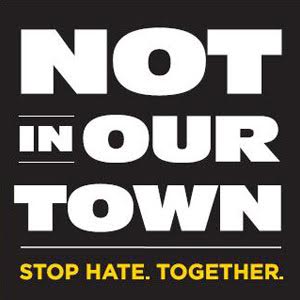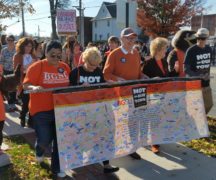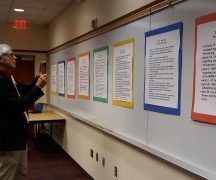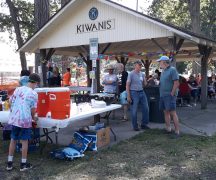During a recent Not in Our Town (NIOT) meeting, Officer Adam Skaff (Bowling Green Police Department Community Liaison) shared an experience that exemplifies the impact words can have in, and on, our community. Words Matter. And Actions matter. Both contribute to a strong community that helps us feel safer and more welcome.
During a late night shift, Skaff and another officer stopped at a local restaurant for their break. As the officers ate their food, a group of young people at a nearby table made negative comments about law enforcement. Skaff emphasized that he feels strong support from the local community.
Sometimes, however, individuals yell slurs at police officers from passing cars or mumble insults as they pass on the street. Most officers ignore these slights, which was what Skaff and his colleague planned to do in this situation. Another group of young people in the restaurant that night told their counterparts to stop. On their way out, these newfound allies stopped at the officers’ table and apologized for their peers’ behavior. Their actions meant a lot to Officer Skaff and his colleagues.
Skaff’s observations about the incident were compelling. He mentioned the importance of strong community relations. He emphasized the importance of holding officers accountable to the highest standards of behavior. He talked about how disheartening it feels to be the target of such negativity. He acknowledged the difficulties of attracting good candidates to a profession that has been so widely criticized.
And Skaff acknowledged that police officers’ experiences cannot compare to the challenges that people of color and other marginalized groups face every day. Ijeoma Oluo, author of So You Want to Talk about Race (Bowling Green’s current Community Read), reminds us that experiences that might seem similar are quite different in terms of their “measureable impact”.
Everyone feels uncomfortable and diminished by harsh words and insults. However, for people in positions or power or privilege, these words sting for a period of time and can be forgotten. For members of historically marginalized communities, these words reflect and reinforce a world that treats them as less than, denies them access, and limits their possibilities.
As Skaff pointed out, the answer to hate in our community can’t be more hate. Let’s follow the lead of those young people who chose to be upstanders instead of bystanders. They made our community better that night, and so can we.





